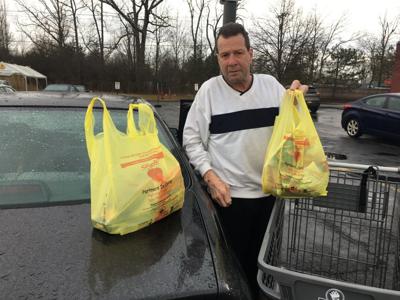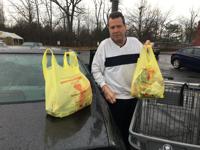More than 100 environmental activist groups are urging the state Department of Environmental Conservation to remember its ban on single-use plastic bags as the state economy reopens.
Enforcement of the ban, which went into effect March 1, has been on hold until June 15 due to a lawsuit. Courts are operating at a bare minimum due to the COVID-19 public health crisis.
In a letter to DEC Commissioner Basil Seggos, 122 watchdog groups requested that enforcement of the ban resume, DEC take steps to inform supermarkets to stop prohibiting customers from using reusable bags and that DEC inform stores to redeem 5-cent beverage container deposits.
DEC will continue to educate the public.
“DEC continues to encourage New Yorkers to transition to reusable bags whenever and wherever they shop and to use common-sense precautions to keep their reusable bags clean,” according to a statement from DEC. “New York’s ban on single-use plastic bags went into effect as planned on March 1. Retailers across the state are complying. We have consistently said since the beginning of our outreach campaign that we will focus on education rather than enforcement.”
Former EPA Regional Administrator and President of Beyond Plastics Judith Enck is calling on DEC to take a more active role.
“For the past few months the priority has been on dealing with COVID-19, as it should have been,” Enck said. “I thank DEC Commissioner Seggos and his staff for their hard work on COVID-19 related issues. But now the economy is slowly opening up and it is time for the DEC to enforce existing environmental laws. There is no data that reusable bags pose a COVID risk and consumers should be able to use them.”
“New Yorkers use a staggering 23 billion plastic bags a year,” Enck said. “The law that bans plastic bags went in to effect on March 1 and it’s time for the DEC to start enforcing that law. Finally, consumers are being charged 5-cent deposits on beverage containers but the DEC has told stores they will not enforce the bottle bill. Just like stores have figured out social distancing at the check out, they need to figure out social distancing at container return areas at their stores. DEC policies will affect how we can function in an environmentally sustainable way, even during health emergencies,”
The New York Public Interest Research Group was among the organizations to sign the letter.
“The plastic pollution crisis demands rapid action,” Environmental Policy Director Elizabeth Moran said. “Eight million metric tons of plastic waste enters the oceans every year, and that won’t stop unless single-use plastic is no longer produced. New York alone contributes 23 billion plastic bags every year to the waste stream. Additionally, many single-use plastics cannot be recycled and end up being too costly for local governments to handle. The plastic industry utilized the COVID-19 pandemic, without any scientific backing, to halt the implementation of plastic bag bans and other plastic bans in states across the country. New York made the right move to ban plastic bags — now is the time to put the law fully into action.”
Environmental Advocates of New York Deputy Director Kate Kurera echoed similar remarks.
“New York state is facing an unprecedented plastic pollution problem and delaying enforcement of the state’s March 1 ban on single-use plastic bags adversely affects the environment.
“We, of course, want to ensure the safety of New Yorkers during the COVID-19 crisis; however, it is unfortunate that the plastics industry is pushing erroneous messaging meant to keep unnecessary plastic bags in rotation. Paper bags and reusable bags are safe — and there is no credible evidence that suggests otherwise. It is important that consumers be permitted to use their reusable bags, which cuts down on the use of paper bags, which, according to Gov. Cuomo’s Plastic Bag Task Force, have a larger carbon footprint than plastic bags.
“We are proud to stand with our 120-plus allies calling on the state DEC to begin enforcing their March 1 plastic bag ban immediately, and inform grocery stores and supermarkets statewide to accept reusable bags and resume bottle deposit redemption practices where suspended.”
Hannaford Supermarkets is among the grocery-store chains bringing back plastic bags for the time being, spokesman Eric Bloom said.
“We have temporarily reintroduced the use of plastic bags in our stores during this time,” Bloom said. “The 5-cent charge for plastic and paper bags has been suspended.”
The company has a policy that shoppers bringing reusable bags must bag their own groceries in light of the pandemic, according to Hannaford’s website.
Price Chopper brought back plastic bags in late March, Vice President Mona Golub said.
“We made the decision to bring plastic bags back into our New York stores at the end of March, based on three factors: the paper bag supply chain was tightening, the conversion to reusables was still in a state of transition and our customers were expressing a higher comfort level with disposable bags in this time of elevated sanitation protocols. This sentiment has since grown,” Golub said.
Tops Markets is another chain that has temporarily brought back plastic.
“Tops is temporarily not enforcing [the ban] in order to help with sanitation concerns surrounding reusable bags and COVID-19,” Tops Markets Public and Media Relations Manager Kathy Sautter said. “If a customer brings in a reusable bag and does not bag their own groceries themselves, the cashier will then bag their groceries in either a plastic or paper bag. There will be no fee for plastic bags however Tops will still be charging a fee for paper bags. This procedure is in place at all of our stores until further notice.”
ShopRite discontinued its use of reusable bags for online orders, reverting to plastic and paper bags, according to its website.
As experts continue to gain a better understanding of the virus, it is not believed that touching objects is a primary form of transmission, according to the Center for Disease Control and Prevention.
“The primary and most important mode of transmission for COVID-19 is through close contact from person to person,” according to the CDC. “Based on data from lab studies on COVID-19 and what we know about similar respiratory diseases, it may be possible that a person can get COVID-19 by touching a surface or object that has the virus on it and then touching their own mouth, nose or possibly their eyes, but this isn’t thought to be the main way the virus spreads.”
Poly-Pak Industries Inc., Green Earth Food Corp., Green Earth Grocery Store, Francisco Marte, The Bodega and the Small Business Association filed a lawsuit naming the state of New York, Gov. Andrew Cuomo, the DEC and DEC Commissioner Basil Seggos as defendants Feb. 28.
The plaintiffs requested that the plastic bag ban be considered void and found vague, unconstitutional and arbitrary.
One inconsistency cited in the claim is that the law makes non-film plastic bags exempt. Non-film plastic bags are described as being less than 10 mils in thickness, according to the regulations, which would require manufacturers to make even thicker plastic bags to be in compliance.
The regulations would cause companies such as Poly-Pak to produce “a product with a greater carbon footprint and no greater functional utility than the reusable plastic bags it already makes,” according to the petition.
Enck was critical of the lawsuit.
“I just don’t think that lawsuit has merit,” she said in April. “The Legislature had the authority to adopt this, stores had nine months to prepare. Poly-Pak is a plastic bag maker. They want to keep making plastic bags.”
Riverkeeper Legislative Advocacy Manager Jeremy Cherson echoed similar remarks.
“I think we’re disappointed the enforce delay has gone into effect and that the industry decided to bring a lawsuit rather than comply with the state’s law,” Cherson said. “But we have full faith that the plastic bag ban will go into effect as intended and the state’s commitment to the ban is still strong.”
Enck and Cherson stressed there is no connection between reusable bags and COVID-19.
“[The misinformation] is unfortunate because there is no medical evidence linking coronavirus to reusable bags,” Enck said. “I recommend people wash their bags with hot water and soap and pack their own groceries to reduce any concerns. When you think about it, it’s a really sensible policy. You know where your bags have been. Single-use plastic bags travel the world and then sit open in stores for many hours before you put your food in it and bring it home.”
Cherson agreed.
“The general perception is that single-use products, plastics in particular, right now are going to protect you more than bringing your reusable bag but to this date there is no evidence of transmission from person to person from a reusable bag,” he said.
Transmission of the virus typically occurs from droplets when a person coughs or sneezes.
“For retailers who are bringing plastic bags back and using the coronavirus as an excuse are flouting the law of the land and Riverkeeper’s opinion is the state will be obligated to enforce the law, unless the litigation changes that,” Cherson said.









